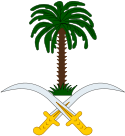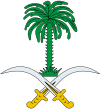- Consultative Assembly of Saudi Arabia
-
Saudi Consultative Assembly
مجلس الشورى السعودي
Majlis al-Shūra al-SaʿūdiyyType Type Unicameral Leadership Speaker Abdullah ibn Muhammad Al ash-Sheikh Members 150 Voting system Appointment by the King Meeting place Al-Yamamah Palace, Riyadh Website www.shura.gov.sa The Consultative Assembly of Saudi Arabia also known as Majlis as-Shura or Shura Council is the formal advisory body of Saudi Arabia, which is an absolute monarchy. It cannot pass or enforce laws, a power reserved for the King. The Consultative Assembly has limited powers in government, including the power to propose laws to the King. It has 150 members, all of whom are appointed by the King. The Consultative Assembly is headed by a Speaker. The current speaker is Abdullah ibn Muhammad Al ash-Sheikh. The King has decided that women may be nominated to the Shura Council in future.[1]
The Consultative Assembly is based in the Al-Yamamah Palace, Riyadh.
The modernization[when?] of the Consultative Assembly of Saudi Arabia or Majlis Ash-Shura was considered by the Saudi government to make a significant improvement in the council's methods (Shura).[2]
Saudi Arabia 
This article is part of the series:
Politics and government of
Saudi ArabiaConstitutionMonarchy- House of Saud
- King
- Crown Prince
- Allegiance Council
Government- Cabinet
- Consultative Assembly
- National Security Council
- CPVPV
- Legal system
- Human rights
- Women's rights
- LGBT rights
- Freedom of religion
- Capital punishment
DivisionsForeign policy
Contents
Powers
The Consultative Assembly is permitted to propose draft laws and forward them to the King, but only the King has the power to pass or enforce them. The Assembly does, however, have the power to interpret laws, as well as examine annual reports referred to it by state ministries and agencies. It can also advise the King on policies he submits to it, along with international treaties and economic plans. The Assembly is also authorized to review the country's annual budget, and call in ministers for questioning.[3]
History
King Fahd decreed a new Majlis Ash-Shura Law in 27/8/1421 H, 24/Nov/2000, which replaced the previous law 1347 H.1928, and decreed the bylaws of the council and their supplements on 22 Aug 1993. The first term council (1993–1997) had a speaker and 60 members. The membership was increased by 30 in each of the second term (1997–2001), third term (2001–2005) and fourth term (2005–2009) councils, given 150 members plus the speaker in the fourth term council.
Having been expanded in 1997 and 2001, the council achieved a place in the International Parliamentary Union by the end of 2003. The fourth term council held 845 sessions and issued 1174 declarations during its second year.[2]
Leadership
The 2009–2013 (fifth term) council, which started on 28 February 2009, includes no women[4] and is led by Chairperson Dr. Abdullah Bin Mohammed Bin Ibrahim Aal Al-Sheikh,[4] Deputy Chairperson Dr. Bandar Bin Mohammed Hamza Asad Hajar, Assistant Chairman Dr. Abdulrahman Bin Abdullah Bin Abdulaziz Al-Barak[5] and Secretary-General Mohammed A. Al Ghamdi.[4]
Committees
The Assembly consists of twelve committees:[6]
- Islamic, Judicial Affairs, and Human Rights Committee
- Social, Family, and Youth Affairs Committee
- Economic Affairs and Energy Committee
- Security Affairs Committee
- Educational and Scientific Research Affairs Committee
- Cultural and Informational Affairs Committee
- Foreign Affairs Committee
- Health and Environmental Affairs Committee
- Financial Affairs Committee
- Transportation, Communications, Information Technology Committee
- Water and Public Facilities and Services Committee
- Administration, Human Resources and Petitions Committee.
See also
- Unicameral legislature
References
- ^ "Women in Saudi Arabia to vote and run in elections". BBC News. 2011-09-26. http://www.bbc.co.uk/news/world-us-canada-15052030. Retrieved 2011-09-26.
- ^ a b Shura.gov.sa
- ^ Wilson, Peter W. & Graham, Douglas: Saudi Arabia: The Coming Storm (1994)
- ^ a b c "Saudi Arabia — Majlis Ash-Shura (Consultative Council)". International Parliamentary Union. 2011. Archived from the original on 2011-03-23. http://www.ipu.org/parline-e/reports/2373_A.htm. Retrieved 2011-03-23.
- ^ "Next Shoura Council members". Saudi Gazette. 2009-02-15. Archived from the original on 2011-03-23. http://www.saudigazette.com.sa/index.cfm?method=home.regcon&contentID=2009021529326. Retrieved 2011-03-23.
- ^ "Committees". Consultative Assembly of Saudi Arabia. 2011. Archived from the original on 2011-03-23. http://www.shura.gov.sa/wps/wcm/connect/ShuraEn/internet/committees/. Retrieved 2011-03-23.
External links
Parliament of Asia Sovereign
statesAfghanistan · Armenia · Azerbaijan · Bahrain · Bangladesh · Bhutan · Brunei · Burma (Myanmar) · Cambodia · People's Republic of China · Cyprus · East Timor (Timor-Leste) · Egypt · Georgia · India · Indonesia · Iran · Iraq · Israel · Japan · Jordan · Kazakhstan · North Korea · South Korea · Kuwait · Kyrgyzstan · Laos · Lebanon · Malaysia · Maldives · Mongolia · Nepal · Oman · Pakistan · Philippines · Qatar · Russia · Saudi Arabia · Singapore · Sri Lanka · Syria · Tajikistan · Thailand · Turkey · Turkmenistan · United Arab Emirates · Uzbekistan · Vietnam · Yemen
States with limited
recognitionAbkhazia · Nagorno-Karabakh · Northern Cyprus · Palestine · Republic of China (Taiwan) · South Ossetia
Dependencies and
other territoriesChristmas Island · Cocos (Keeling) Islands · Hong Kong · Macau
Categories:- National legislatures
- Politics of Saudi Arabia
- Unicameral legislatures
Wikimedia Foundation. 2010.

